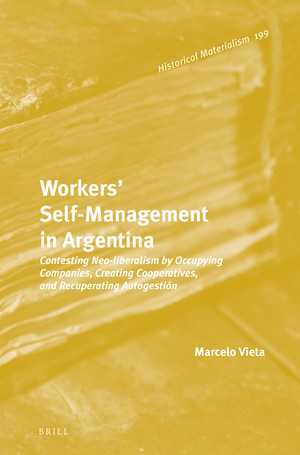Marcelo Vieta
In Workers’ Self-Management in Argentina, Marcelo Vieta homes in on the emergence and consolidation of Argentina’s empresas recuperadas por sus trabajadores (ERTs, worker-recuperated enterprises), a workers’ occupy movement that surged at the turn-of-the-millennium in the thick of the country’s neo-liberal crisis. Since then, around 400 companies have been taken over and converted to cooperatives by almost 16,000 workers. Grounded in class-struggle Marxism and a critical sociology of work, the book situates the ERT movement in Argentina’s long tradition of working-class activism and the broader history of workers’ responses to capitalist crisis. Beginning with the voices of the movement’s protagonists, Vieta ultimately develops a compelling social theory of autogestión – a politically prefigurative and ethically infused notion of workers’ self-management that unleashes radical social change for work organisations, surrounding communities, and beyond.
Biographical note
Marcelo Vieta, Ph.D. (2012), York University, is Assistant Professor of Workplace and Organisational Learning and the Social Economy at the University of Toronto. He has published widely on critical theory, workers’ control and self-management, and on the social economy and social movements in Italy, Canada, Argentina, and Latin American.
Readership
Academic libraries, specialists, post-graduate and undergraduate students, unions, and labour and social movement activists interested in workers’ control and self-management, the social economy, cooperatives, the sociology of work, and Argentine political economy and labour history.
Table of contents
Acknowledgements
Table of Contents
List of Figures
List of Tables
List of Abbreviations and Acronyms
Glossary of Spanish and Other Foreign Terms and Phrases
Preface
Introduction
PART 1
The Emergence of Argentina’s Empresas Recuperadas por sus Trabajadores: From Workers’ Lived Experiences of Crisis to Autogestión
1. ‘Destiny in Our Own Hands’: Three Stories of Workplace Recuperations
Cooperativa de Trabajo Chilavert Artes Gráficas
Cooperativa de Trabajo ‘Unión Solidaria de Trabajadores’
Cooperativa de Trabajo de la Salud Junín
Mobilising Direct Action Strategies and Workplace Solidarity
2. Empresas Recuparadas pos sus Trabajadores: Why, Where, What, and How
Section 1: The Emergence of Argentina’s Empresas Recuperadas (with Andrés Ruggeri)
Section 2: ERT Types and Experiences of Workplace Conversions Around the World
The Emergence and Characteristics of Empresas Recuperadas: A Summation
3. The Political Economy of Argentina’s Working Class: Historical Underpinnings of the Empresas Recuperadas
Section 1: The Rise and Consolidation of Argentina’s Working Class (1900–89)
Section 2: Argentina’s Neo-liberal Turn and the After-effects of Socio-Economic Crisis (1990–2016)
Section 3: Working-Class Recomposition and New Forms of Self-Managed Workers’ Organisations (2001–17)
ERTs and the Political Economy of the Working Class in Argentina: A Summation
PART 2
Theorising and Historicising Autogestión
Chapter 4 The Stream of Self-Determination: Freedom, Cooperation, and the Recuperations of Living Labour
Section 1: The Stream of Self-Determination and Modern Socialist Thought
Section 2: Critical Theories of Labour and Capitalist Technology
Section 3: ERTs’ Six Recuperative Moments
Cooperative Self-Determination, Recuperation, and Argentina’s ERTs: Looking Forward
5. A Genealogy of Autogestión
Section 1: Autogestión and the Self-Determination of Productive Life
Section 2: Cooperatives, the Social and Solidarity Economy, and Autogestión
Autogestión and the Continuing Stream of Self-Determination
PART 3 The Consolidation of Argentina’s Empresas Recuperadas: Common Experiences, Challenges, and Social Transformations
Chapter 6. ‘Occupy, Resist, Produce’: Commonalities in the Lived Experiences of Recuperating Workplaces in Argentina (with Andrés Ruggeri)
Section 1: From Workplace Conflicts to Autogestión
Section 2: The Strategies and Tactics of ‘Occupy, Resist, Produce’
Re-appropriating Relevant Laws, Deploying Cooperative Values
7. The Challenges of Autogestión and ERT Workers’ Responses
Section 1: Production Challenges
Section 2: An Ambivalent Relationship with the State
Section 3: Local and Transnational Solidarity Networks of Autogestión
Organising Between ERTs and the Community to Collectively Overcome Challenges
8. Recuperating the Labour Process, Transforming Subjectivities: From Empleados to Compañeros and Trabajadores Autogestionados
Section 1: Cooperatively Working and Democratising the Shop
Section 2: Recuperating Cooperative Skills and Values, Informal Shop Floor Learning, and Transformed Subjectivities
Section 3: Recuperating Social Production for Social Wealth
Challenging ERTs’ ‘Dual Reality’
PART 4 Recuperating Autogestión
9. Recuperating Autogestión, Prefiguring Alternatives: Some Possible Conclusions
On Workers’ Recuperations of Autogestión
The Conjunctural Realities of Argentina’s ERTs
Autogestión and Argentina’s ERTs
Revisiting ERTs’ ‘Dual Reality’
Revisiting ERTs’ Radical Social Innovations and Recuperative Moments
Revisiting the Definition of Argentina’s Empresas Recuperadas por sus Trabajadores
Closing Thoughts, Continued Openings
Appendix: Formal Interviews Conducted, Meetings Attended, and Cooperatives Visited
Bibliography


